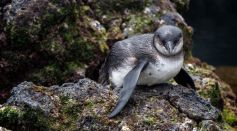ENVIRONMENT & CLIMATE
Unique DNA in Owl Eyes Give Them Night Vision to Rule the Dark
What Makes The Upcoming Hunter's Blue Moon Rare
Experts Found These Tiny Yet Clumsy Bat-Winged Dinosaurs
Greenpeace and Local Fisheries Oppose Plans to Release Nuclear-Contaminated Water Into the Ocean

The Galapagos Sees Record Increase in Its Endemic Penguins and Cormorants
Oral Contraceptives Pollute Water Which Hinders the Ability of Fish to Reproduce
Harmful Asbestos May Help Alleviate Carbon Gas Emissions
[WATCH]: Wild Pandas Courtship and Mating Filmed For the First Time
Washington State Set To Destroy First Murder Hornets Nest

Here's Why South America Filled With Mammals From North America

Ecologists and Locals Are Against HS2's Clearing of Ancient Woodlands

Like Humans, Chimps Also Prefer Less Friends Later in Life

The Schmidt Family Foundation Gives Two Grants for Climate Change Research
New Archaeological Dig Finds Advanced Water Filters From the Maya Civilization
Most Popular

Blood Moon to Appear During Total Lunar Eclipse on March 3, 2026

The Science of Aging: What Cellular Aging and Telomeres Reveal About Human Longevity

NASA Reveals an Astronaut Was Medically Evacuated From the ISS for the First Time After a Non-Emergency Health Scare

How Volcanoes Destroy, Build Land, and Shape Earth's Surface and Climate




